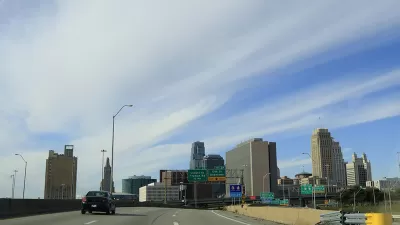The competition to determine which communities in Kansas City will qualify to receive Google Fiber, the nation's fastest internet service, has stoked fears of increasing the city's historic patterns of segregation, reports John Eligon.
When Google announced that it would pilot the nation's fastest internet service in Kansas City, many in the city's poorest communities saw hope in increased opportunities for education and economic development. But when the company unveiled how the program would roll out, with "only those areas where enough residents preregistered and paid a $10
deposit would get the service, Google Fiber," those hopes were dashed, and replaced with fears that the city's racial and economic segregation would be exacerbated, rather than healed.
"While nearly all of the
affluent, mostly white neighborhoods here quickly got enough
registrants," reports Eligon, "a broad swath of black communities lagged." According to Eligon, Google and local organizations have been active in trying to register disadvantaged neighborhoods. But, "As of Sunday evening, only about 32 percent of people in the
neighborhoods that qualified for Google Fiber were black, while just
over 54 percent were white, according to [Andrew Beveridge, a sociology professor at Queens College in New York City]."
"In some neighborhoods, residents feared that if the service were
unavailable in their communities, property values would drop and their
schools and hospitals may fall further behind those in affluent areas.
Businesses that rely on technology might shun their communities, they
said, denying them jobs and economic development opportunities."
FULL STORY: In One City, Signing Up for Internet Becomes a Civic Cause

Planetizen Federal Action Tracker
A weekly monitor of how Trump’s orders and actions are impacting planners and planning in America.

Maui's Vacation Rental Debate Turns Ugly
Verbal attacks, misinformation campaigns and fistfights plague a high-stakes debate to convert thousands of vacation rentals into long-term housing.

San Francisco Suspends Traffic Calming Amidst Record Deaths
Citing “a challenging fiscal landscape,” the city will cease the program on the heels of 42 traffic deaths, including 24 pedestrians.

Defunct Pittsburgh Power Plant to Become Residential Tower
A decommissioned steam heat plant will be redeveloped into almost 100 affordable housing units.

Trump Prompts Restructuring of Transportation Research Board in “Unprecedented Overreach”
The TRB has eliminated more than half of its committees including those focused on climate, equity, and cities.

Amtrak Rolls Out New Orleans to Alabama “Mardi Gras” Train
The new service will operate morning and evening departures between Mobile and New Orleans.
Urban Design for Planners 1: Software Tools
This six-course series explores essential urban design concepts using open source software and equips planners with the tools they need to participate fully in the urban design process.
Planning for Universal Design
Learn the tools for implementing Universal Design in planning regulations.
Heyer Gruel & Associates PA
JM Goldson LLC
Custer County Colorado
City of Camden Redevelopment Agency
City of Astoria
Transportation Research & Education Center (TREC) at Portland State University
Jefferson Parish Government
Camden Redevelopment Agency
City of Claremont




























